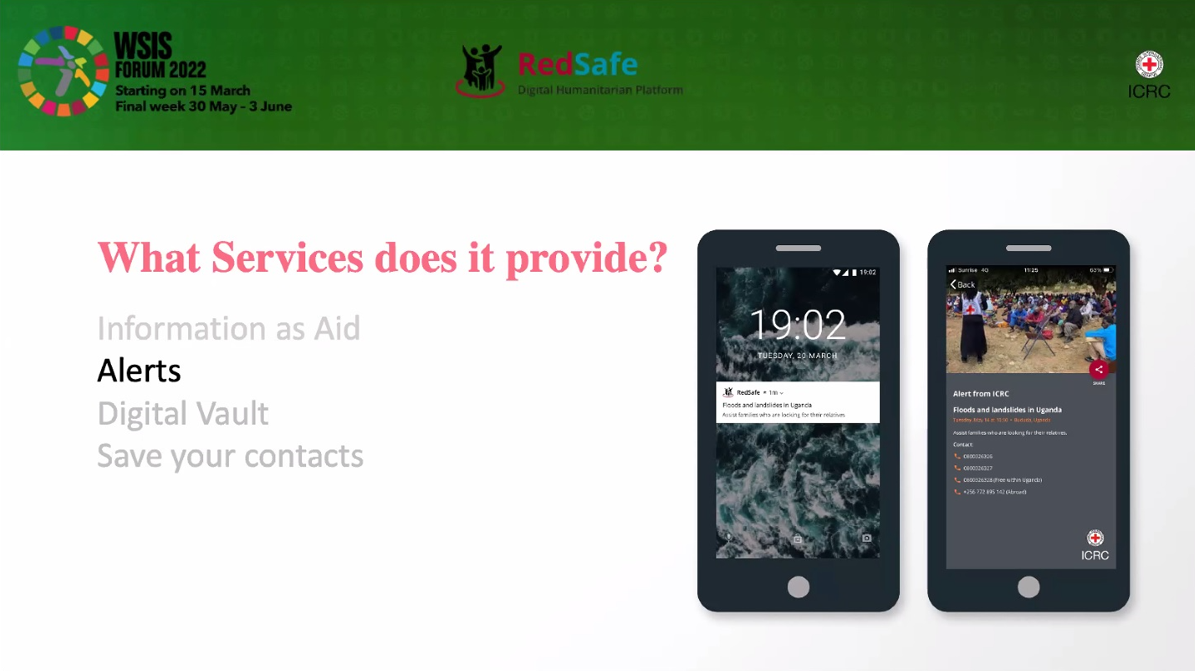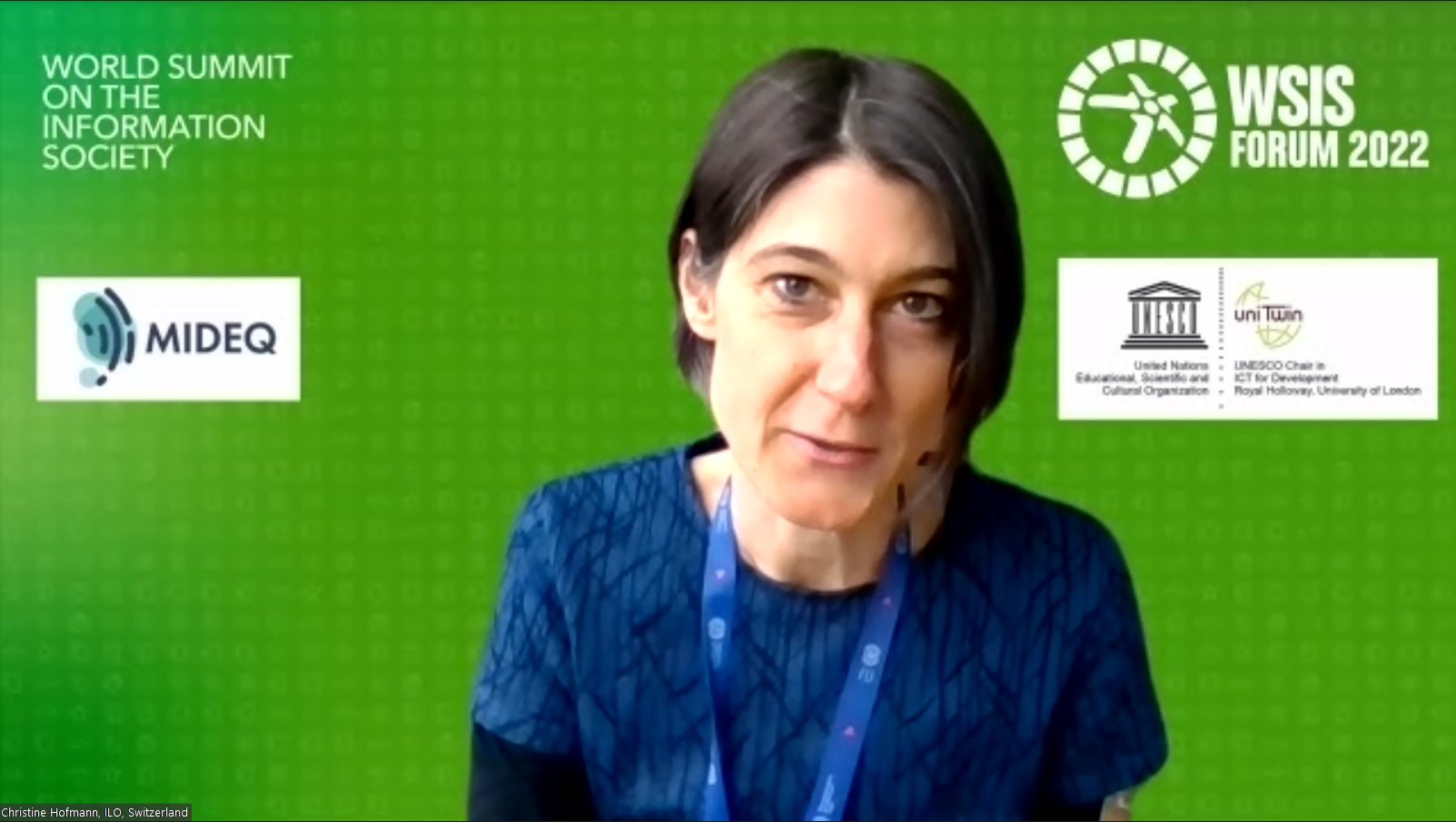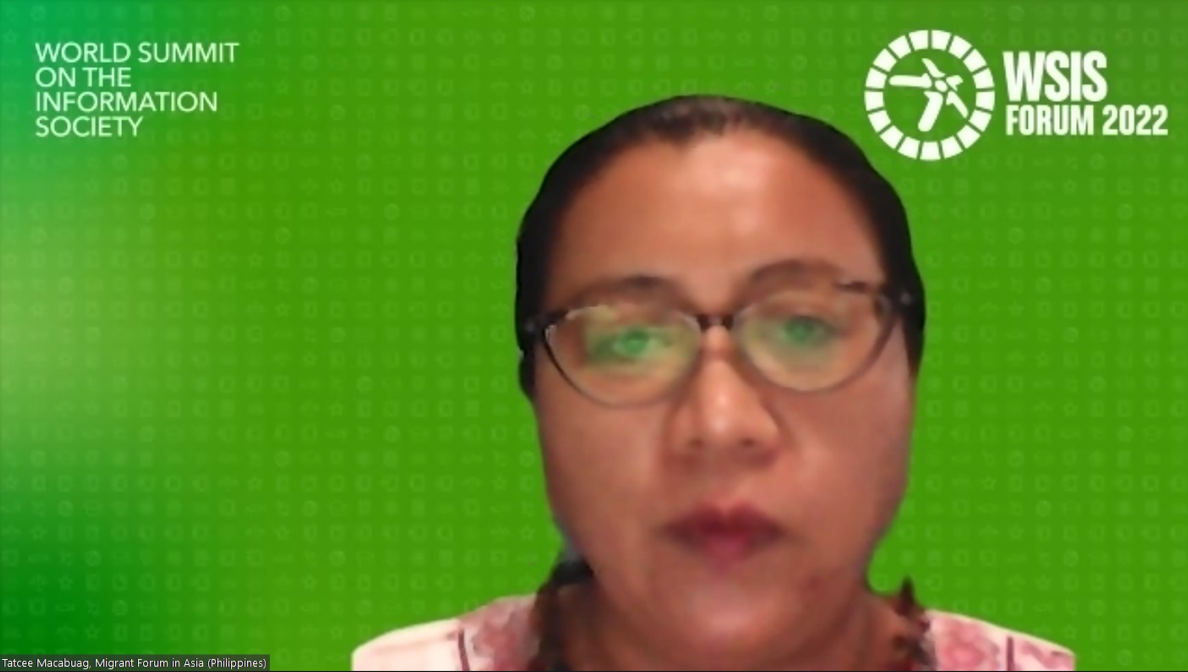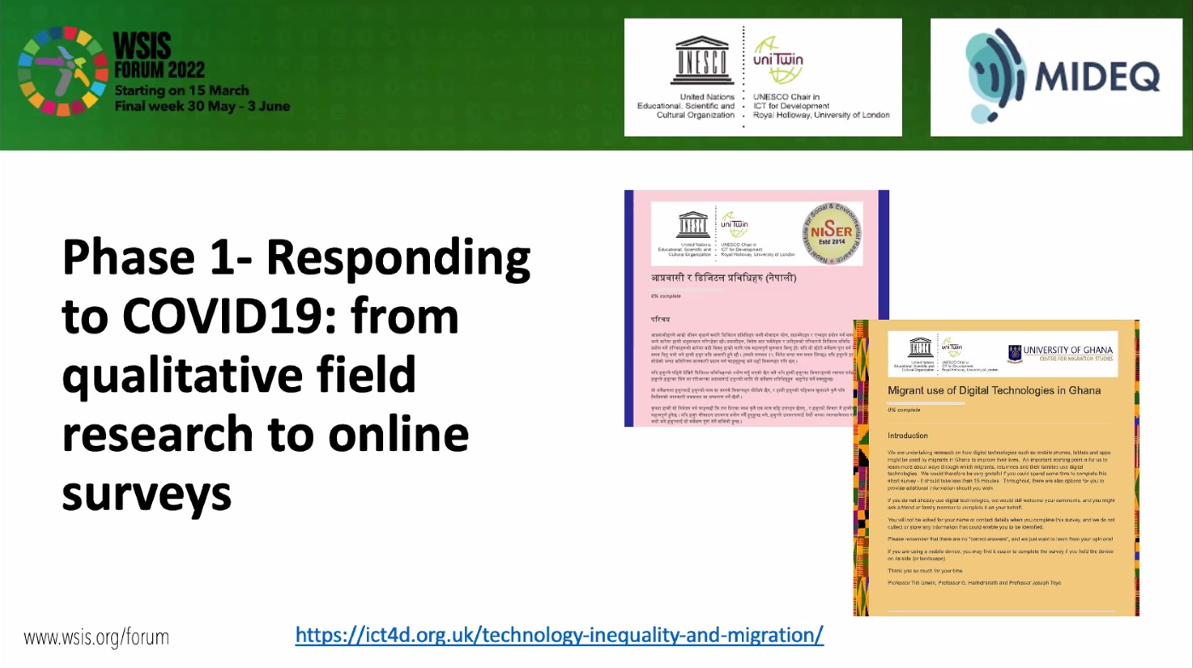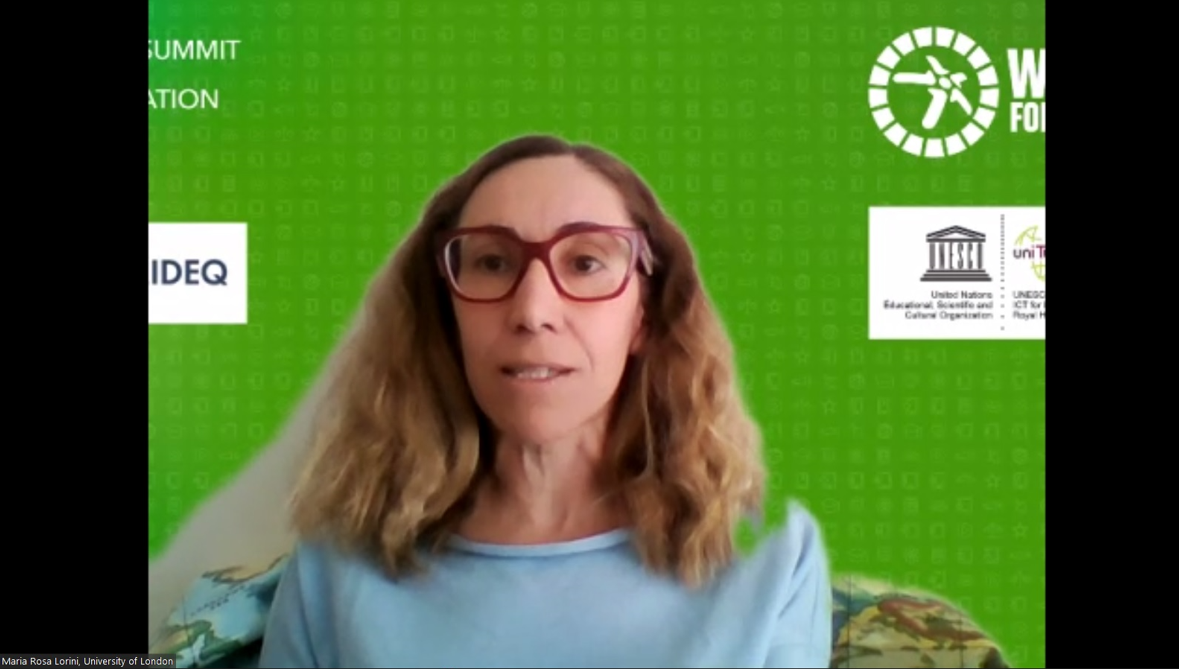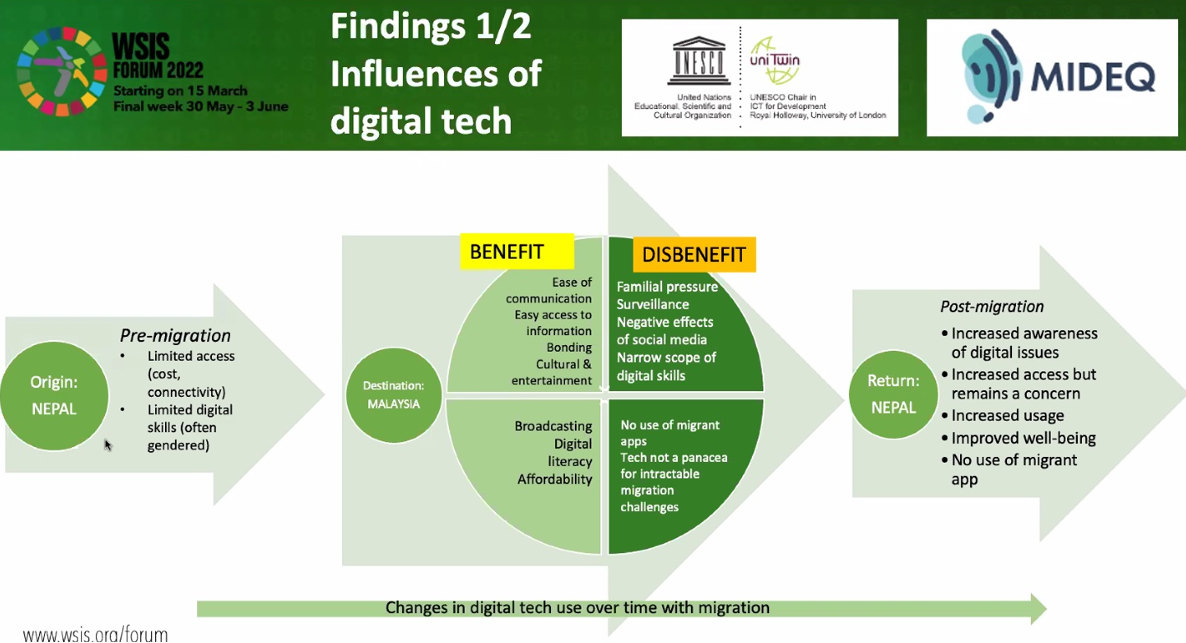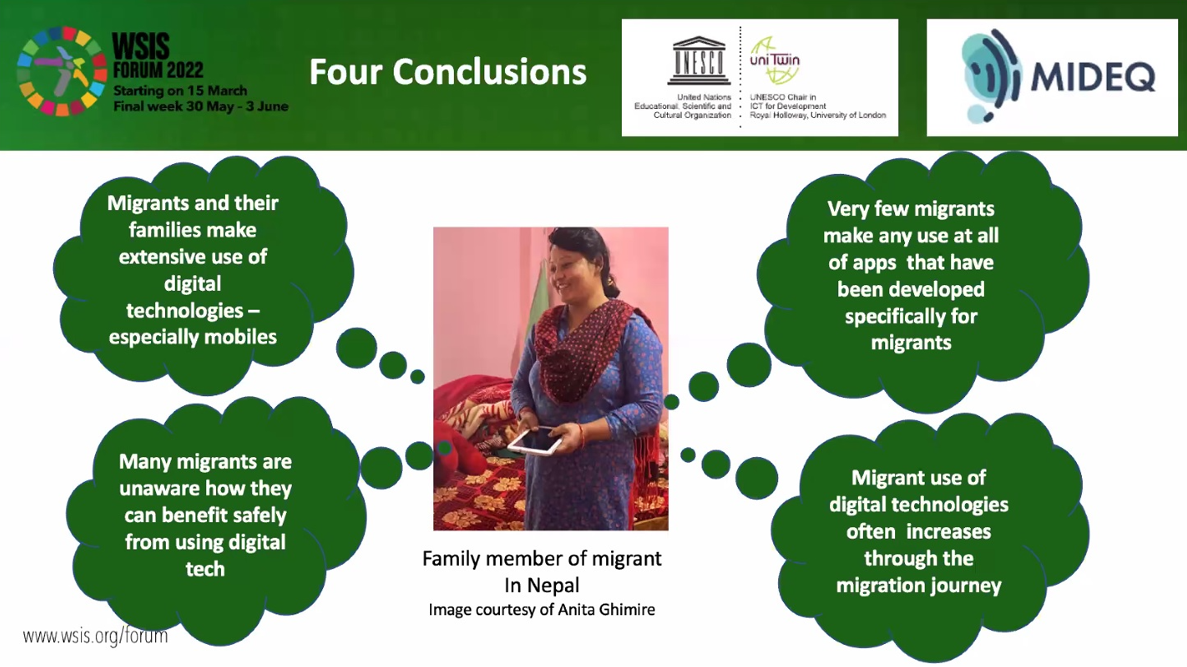Digital Technologies, Inequality, and Development in the context of South-South Migration
Royal Holloway, University of London
Session 240
Digital technologies and migration are inextricably linked and feature widely in the SDGs. This session aims to share good practices and make recommendations concerning migrant use of digital tech. Considerable research has highlighted the positive role of digital tech in the lives of migrants, but there is now increasing concern about its darker side that can be disempowering for vulnerable migrants often despite the good intentions of those who design it. Our intervention-research is part of a larger project, Migration for Development and Equality (http://www.mideq.org), focused on “the complex and multi-dimensional relationships between migration and inequality in the context of the Global South”.
There are many examples of migrant apps designed to help migrants orient themselves, to access labour and government information and services, or to rate employers and recruitment agencies, but our ongoing research (see https://ict4d.org.uk/technology-inequality-and-migration/) suggests that such apps are hardly ever used by migrants. Our multi-country, mixed methods research covering the migration corridors of Nepal-Malaysia, Ethiopia-South Africa, China-Ghana and Haiti-Brazil shows that migrants overwhelmingly do not use apps that have been specifically designed for them. Yet migrants use digital technologies extensively in their daily lives and also subject to increasing digital interventions from states, employers and even humanitarian organisations. How can we ensure the safe use of digital technologies by migrants? How can we enhance their benefits to migrants while reducing potential harmful consequences?
This interactive panel session, which aligns with WSIS Action Lines C3, C4, C5, C7, C8 and C10, will bring together speakers from academia and practice including migrant advocacy organisations, international agencies and civil society groups to address these questions with a view to identifying pathways for the safe use of such technologies to address inequalities faced by migrants and their family members.
The session will take the form of short 5 minute talks by each panel member, followed by an interactive, moderated discussion with the audience as well as among the panellists. The contribution from the MIDEQ project team at Royal Holloway, University of London will highlight our research in four migration corridors in the Global South on the current use of digital technologies by migrants and potential for digital interventions that can help improve their lives. Panellists from the International Organization for Migration (IOM Brazil) and the International Labour Organisation (ILO) will present their key digital initiatives involving migrants; the International Committee of the Red Cross (ICRC) will showcase their recent digital intervention in the form of Red Safe, a digital humanitarian platform that aims to provide safe and reliable information for those affected by migration, conflict and other humanitarian crisis; Migrant Forum in Asia (MFA) will present their experience of advocating for migrants through their digital and on-the-ground complaints resolution mechanisms for migrants. The session will conclude with recommendations from the panel concerning what they think needs to change for the potential harms of digital tech to be mitigated in the context of migration.
The session will be convened by the MIDEQ team based at Royal Holloway, University of London.

Berta Panes has been working in the humanitarian field for over 20 years. Initially with the UN, in peacekeeping operations and since 2009 with the International Committee of the Red Cross (ICRC). Her work has focused on protection of civilian population in conflict and post conflict countries across the world specializing in detention, restoring family links and building resilience amongst communities affected by violence. Since 2019 she has been working at ICRC headquarters in the development of RedSafe, a safe and secure platform offering humanitarian services online. The first pilot was deployed mid 2021 in Southern Africa for migrants seeking services and information in the area.

Christine works as the Team Lead on Skills for Social Inclusion in the ILO’s Skills and Employability Branch in Geneva. She leads research and knowledge products, builds capacity and designs projects on skills and lifelong learning approaches that include persons with disabilities, informal economy workers, migrant workers, forcibly displaced people, LGBTI people and other vulnerable groups. She supports ILO constituents in making skills development and recognition systems more inclusive, and works with the ILO’s network of skills specialists around the world. She spent five years in Cairo as the ILO’s skills specialist for North Africa supporting ILO constituents and projects in the areas of TVET, youth employment, apprenticeship, rural skills training, skills anticipation etc. in 12 countries. Prior to that, among others, she co-authored the ILO’s Skills for green jobs book, and developed a Resource guide on upgrading informal apprenticeship in Africa. Before joining the ILO, Christine worked as a political consultant and coordinated development projects for trade unions in Africa and Asia for a German labour foundation. She holds a degree in International Business and Area Studies.

Guilherme Otero is Project Coordinator at the International Organization for Migration (IOM), Head of IOM Sub-Office in São Paulo, Brazil. He holds a B.A in International Relations (University of São Paulo - USP) and a Masters’ Degree in Public Policy (Federal University of ABC - UFABC). He is a former assistant coordinator at the São Paulo City Hall’s Office for Migrant Policies. In 10 years of experience in the field of migration, Guilherme has worked in the areas of education and human rights, migration policy and local governance, humanitarian response, migrant integration, emigration and diaspora engagement, and return migration.

Tatcee Lorena Macabuag is an activist, migrants rights advocate and a current programme coordinator of Migrant Forum in Asia. As programme coordinator she is tasked to support and develop program areas of MFA on: 1.) labour migration and recruitment, 2.) research and documentation and 3.) Advocacy and Capacity building. She was part of the core MFA team that developed MFA's online complaints and documentation system, Hamsa.
(MFA) is the biggest network in Asia of organizations, civil society groups, trade unions and advocates working on social justice for migrants and their families. MFA has a membership of more than 200 organizations and is represented in 27 countries in Asia.
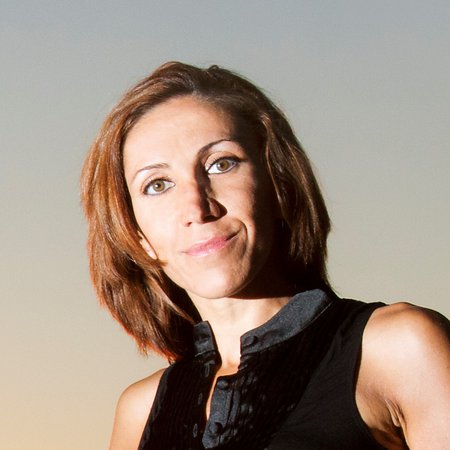
Dr. Maria Rosa Lorini is a Post-Doctoral Researcher in the School of Management at Royal Holloway, University of London. Maria Rosa has a background in both civil society organisations and academia. Between 2008 and 2012 she directed a HIV/AIDS project for the Cesvi Fondazione Onlus in South Africa, and before that she also worked for the United Nations Operation in Côte d’Ivoire on human rights and the rule of law. Immediately prior to joining Royal Holloway, she was most recently a post-doctoral researcher at the University of Cape Town, with which she maintains close connections. She is working primarily on digital technologies and migration as part of the team contributing to the MIDEQ project.

Tim Unwin is Emeritus Professor of Geography and Chairholder of the UNESCO Chair in ICT4D at Royal Holloway, University of London. He was Secretary General of the Commonwealth Telecommunications Organisation (CTO) from 2011-2015, and was Chair of the Commonwealth Scholarship Commission from 2009-2014. In 2018-19 he led the co-ordination of 21 UN agencies on behalf of UNESCO and UNICEF to develop a system-wide strategy on the future of education and learning for the UN’s High Level Committee on Programmes and Chief Executives Board.
His influential edited book Information and Communication Technologies for Development, was published by Cambridge University Press in 2009, and his latest book Reclaiming ICT4D was published by Oxford University Press in 2017. Most of his research and writing currently focuses on the inequalities caused by digital technologies and what needs to be done to ensure that the poorest and most marginalised people can benefit from them.

G Hari Harindranath is a Professor of Information Systems in the School of Management at Royal Holloway, University of London and a member of the UNESCO Chair in ICT4D, also based at Royal Holloway. Hari has a background in political economy and holds a doctorate in Information Systems from the London School of Economics. His research centres on the social and organisational implications of digital technologies, including ICT4D. Hari is an Editorial Board Member of the Journal of Information Technology, Associate Editor of Information & Management, and Senior Editor of Information Technology & People. He is co-founder of the Association for Information Systems-affiliate conference, International Conference on Information Resources Management (Conf-IRM).
-
 C3. Access to information and knowledge
C3. Access to information and knowledge
-
 C4. Capacity building
C4. Capacity building
-
 C5. Building confidence and security in use of ICTs
C5. Building confidence and security in use of ICTs
-
 C7. ICT applications: benefits in all aspects of life — E-government
C7. ICT applications: benefits in all aspects of life — E-government
-
 C7. ICT applications: benefits in all aspects of life — E-learning
C7. ICT applications: benefits in all aspects of life — E-learning
-
 C7. ICT applications: benefits in all aspects of life — E-health
C7. ICT applications: benefits in all aspects of life — E-health
-
 C7. ICT applications: benefits in all aspects of life — E-employment
C7. ICT applications: benefits in all aspects of life — E-employment
-
 C8. Cultural diversity and identity, linguistic diversity and local content
C8. Cultural diversity and identity, linguistic diversity and local content
-
 C10. Ethical dimensions of the Information Society
C10. Ethical dimensions of the Information Society
The session aligns with WSIS Action Lines C3, C4, C5, C7 (particularly e-government, e-health, e-learning and e-employmen), C8 and C10 as digital technologies increasingly used in these areas have a direct impact on migrants and their well being. Ensuring that these impacts are beneficial is key to creating an inclusive agenda for the use of digital tech in the context of migration.
-
 Goal 1: End poverty in all its forms everywhere
Goal 1: End poverty in all its forms everywhere
-
 Goal 3: Ensure healthy lives and promote well-being for all
Goal 3: Ensure healthy lives and promote well-being for all
-
 Goal 4: Ensure inclusive and equitable quality education and promote lifelong learning opportunities for all
Goal 4: Ensure inclusive and equitable quality education and promote lifelong learning opportunities for all
-
 Goal 5: Achieve gender equality and empower all women and girls
Goal 5: Achieve gender equality and empower all women and girls
-
 Goal 8: Promote inclusive and sustainable economic growth, employment and decent work for all
Goal 8: Promote inclusive and sustainable economic growth, employment and decent work for all
-
 Goal 10: Reduce inequality within and among countries
Goal 10: Reduce inequality within and among countries
-
 Goal 16: Promote just, peaceful and inclusive societies
Goal 16: Promote just, peaceful and inclusive societies
The session is directly relevant to the SDGs as migration has been recognised as a key contributor to development. Access to and use of digital technologies has wide-ranging consequences for development. Digital technologies can be leveraged to increase access to opportunities and rights for migrants, boosting migration’s developmental benefits at the interface between migrants and host communities. Yet these technologies can have unintended consequences for migrants and, in contexts of unequal access, can increase or create new inequalities. The session will aim to provide guidance on what needs to change for the potential harms of digital tech to be mitigated in the context of migration.
https://www.mideq.org
https://ict4d.org.uk/technology-inequality-and-migration
https://www.iom.int
https://www.ilo.org
https://www.icrc.org/en/redsafe
https://mfasia.org/


